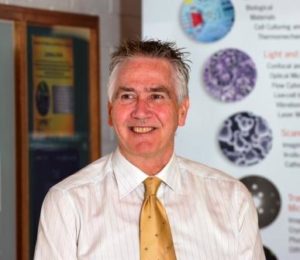
They’re smaller than the eye can see, as fast as a speeding bullet, and may hold the key to some of Australia’s deadliest puzzles.
Fortunately for South Australia, Flinders Professor of Forensic Science Paul Kirkbride is a man who loves puzzles. Even more fortunately, he is very good at solving them.
“I’ve always enjoyed puzzles, and I’m always on the lookout for new technologies to help me solve the ones that come up in forensics,” Professor Kirkbride said.
As a former Assistant Director at Forensic Science SA and Chief Scientist at the Australian Federal Police, Professor Kirkbride has a long track record of pushing back the limits of forensic technology.
The most sophisticated technology he has explored to date is Time of Flight Secondary Ion Mass Spectrometry, or ToF-SIMS, which is used in analysing surfaces with extreme sensitivity, including mineral particles in mining.
Professor Kirkbride realised the technique could be used to examine tiny fragments of glass present in the primer in bullet cartridges in great detail. This brought him together with Professor Bill Skinner of the University of South Australia’s Ian Wark Research Institute which, at the time, possessed the only ToF-SIMS in Australia. This began a long collaboration that produced three PhD graduates.
“The new approach is allowing us to identify glass both in gunshot wounds and on the person who has fired the gun, which means we can link the two and even make a link back to the ammunition that was used,” Professor Kirkbride said.
“In the case of gunshot residue, that’s a new piece of the puzzle, because previously we could tell whether someone had fired a gun but we couldn’t link a particular residue on that person with a particular ammunition.”
The technology has already helped close one murder case in Western Australia, and Professor Kirkbride is cautiously optimistic that one day it could support prosecutions across the country – and even help solve some of Australia’s cold cases.
He smiles at the suggestion that his work sounds like the kind of hi-tech crime solving seen on television shows like CSI New York, replying that real-life forensics has some way to go before the fact matches the fiction, but that it would be a great end point.
What is clear, however, is that through his work, he is committed to closing the gap.
“The thing that’s really exciting about this research is that it will give a completely new capability – which is the capability to link residues with the ammunition that they came from,” Professor Kirkbride said.
“In theory we could refine the technology to the point where we might be able to establish the manufacturer and brand and perhaps even batch of ammunition that has been used.”
Professor Kirkbride’s research recently caught the attention of the SA Government Premier’s Research and Industry Fund, which is providing financial support to advance the work further. The Fund will be used to provide a three-year, $30,000 scholarship to a PhD candidate to work on gunshot residue research at Flinders University.
Support is also available for a PhD scholarship at the University of Technology Sydney, with the collaboration of Prof Claude Roux, and a post-doctoral researcher at the University of South Australia.
The three researchers will be part of a collaborative effort involving Forensic Science SA, SA Police, the Chemistry Centre WA, Geoscience Australia and Australian Scientific Instruments.
Professor Kirkbride will supervise the Flinders PhD candidate, who will work primarily on transference and persistence of gunshot residue, and could also work on propellant residues. This student will work closely with the researcher at UniSA, both of whom will also have the opportunity to work with another piece of “cutting edge” mining equipment called the ‘SHRIMP’, which is jointly owned by Geoscience Australia and Australian Scientific Instruments in Canberra.
“This is a rare opportunity for PhD candidates to work at the cutting edge of forensic science technology,” he said.
“I’m hoping the right people may read this story and be tempted by the opportunity to work with me on this particular puzzle.”
Further inquiries about the scholarships on offer can be made by emailing Professor Kirkbride at paul.kirkbride@flinders.edu.au or by calling him on 08 8201 3011.

